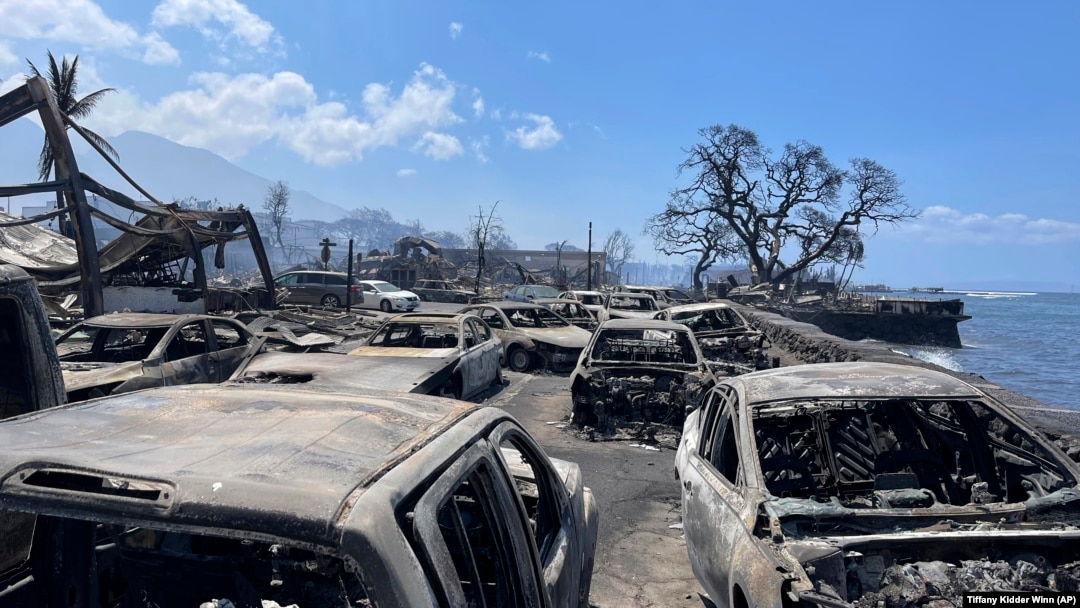Here are some of the Native American-related stories that made headlines this week:
Native Hawaiians missing, dead or displaced by Maui wildfires
Native Hawaiians – the Kānaka Maoli – are struggling to comprehend the devastation caused by wildfires in Maui, last week. At least 111 people – including children – are dead, and that number is expected to rise as the search for remains continues.
Hawaii Gov. Josh Green told CNN on Wednesday that “probably over 1,000” residents are still missing.
The fire, which broke out August 8, devastated the community of Lahaina, leaving thousands of people unhoused. Lahaina, an important Native Hawaiian cultural center, was between 1820 and 1845 the capital of the Kingdom of Hawaii. Officials say it will cost more than $5.5 billion to rebuild.
Read more:

A solar farm sits Aug. 9, 2022, in Mona, Utah. The Biden Administration seeks to accelerate the expansion of clean energy such as wind and solar power, speeding the transition away from fossil fuels that largely cause climate change. AP Photo/Rick Bowmer
Biden administration injecting funds into tribal clean energy programs
The Department of the Interior this week announced a new program that will initially make available $72.5 million to help Native American communities bring clean energy to tribal homes.
An estimated 17,000 tribal families live without electricity, most of them in the Southwest and Alaska. The Tribal Electrification Program will provide money and expertise to help tribes electrify homes using environmentally friendly energy sources.
It will also help homes that already have electricity switch to cleaner energy options and provide support for home repairs and changes needed to make this happen.
The new funding announcement is part of an overall $150 million investment from the Inflation Reduction Act to support the electrification of homes in tribal communities.
“Climate change is the crisis of our lifetimes and has left far too many communities managing for worsening water challenges, extreme heat, devastating wildfires and unprecedented storms. Every action we take now to lessen the impacts for future generations is critical,” Interior Secretary Deb Haaland said.
“Through President [Joe] Biden’s Investing in America agenda, we’re launching a new program to electrify Indian Country to provide reliable, resilient energy that Tribes can rely on, and advance our work to tackle the climate crisis and build a clean energy future.”
Read more:
Water from the Colorado River diverted through the Central Arizona Project fills an irrigation canal, Thursday, Aug. 18, 2022, in Maricopa, Ariz. (AP Photo/Matt York, File)
Interior Department to fund water systems in drought-ridden Upper Colorado River Basin
In a related story, the Department of the Interior this week also announced it will make available $50 million over the next five years to improve key water supply systems and drought-related data collection across the Upper Colorado River Basin.
“The Biden-Harris administration is committed to bringing every tool and every resource to bear to as we work with states, Tribes and communities throughout the West to find long-term solutions in the face of climate change and the sustained drought it is creating,” Deputy Secretary Tommy Beaudreau said.
“As we look toward the next decade of Colorado River guidelines and strategies, we are simultaneously making smart investments now that will make our path forward stronger and more sustainable.”
Read more:
Undated photo shows Native American rights trailblazer and former Menominee leader Ada Deer, who died August 15, 2023, at age 88.
Celebrated Menominee activist Ada Deer dies
Ada Deer, the first woman to lead the Interior Department’s Bureau of Indian Affairs, died on Tuesday at the age of 88.
A well-known champion for Native American rights and sovereignty, Deer grew up on the Menominee Indian Reservation in Keshena, Wisconsin. After earning her bachelor’s and master’s degrees, she worked as a social worker in New York and Wisconsin.
In 1954, during the so-called “Termination Era,” Congress withdrew its recognition of the Menominee tribe, which meant their lands were now under state control and up for development. It also meant the tribe lost all federal benefits, such as health care and education, and was plunged into poverty.
In the early 1970s, Deer and other Menominee supporters launched a grassroots movement — Determination of Rights and Unity of Menominee Shareholders, or DRUMS — in protest, and took their case to Washington.
“You don’t have to collapse just because there’s a federal law in your way. Change it,” she told The Washington Post in 1973.
In late 1973, President Richard Nixon signed the Menominee Restoration Act, reinstating the tribe’s protected status and benefits.
President Bill Clinton in 1973 appointed her assistant secretary for Indian Affairs at the Interior Department, overseeing the Bureau of Indian Affairs.
Read more:
Federal judge in Wisconsin upholds tribe’s sovereignty over roadways
A federal judge this week dismissed a lawsuit that aimed to force the Lac du Flambeau Tribe in Wisconsin to remove road barricades it had put in place in January.
The blocked roads were built on tribal land in the 1960s and are the only route in and out for non-Natives living on the reservation. Land agreements allowing them to use the roads expired in 2013, and negotiations to extend them have so far failed. The Lac du Flambeau Tribal Council says it is owed $20 million for trespassing on its land since the easements expired.
A group of non-tribal residents in February filed suit against the 12-member tribal council. The court held oral arguments June 7, 2023, and on Tuesday, U.S. District Judge William Conley dismissed the lawsuit altogether, acknowledging tribal sovereign rights over the roads, a matter over which federal courts lack jurisdiction.
Read more:
Native American Journalists Association rebrands
Members of the Native American Journalists Association have voted to change the organization’s name to the Indigenous Journalists Association (IJA).
They voted 89 to 55 in favor of the change during their annual conference, which was hosted in Winnipeg last week.
Francine Compton, IJA associate director, said the move was made to match international language and to ensure all First Nations, Metis, Native American and Inuit journalists are included and supported.
"It means a whole lot to me, that I can now have this organization with a name where people in my own community can look at it and say, 'That's for me,'" said Compton, who is Anishinaabe from the Sandy Bay Ojibway First Nation, 131 kilometers northwest of Winnipeg.
The organization also updated the logo from NAJA with a feather to a stylized “IJA,” above.
Read more: https://www.cbc.ca/news/indigenous/indigenous-journalists-association-1.6937231


